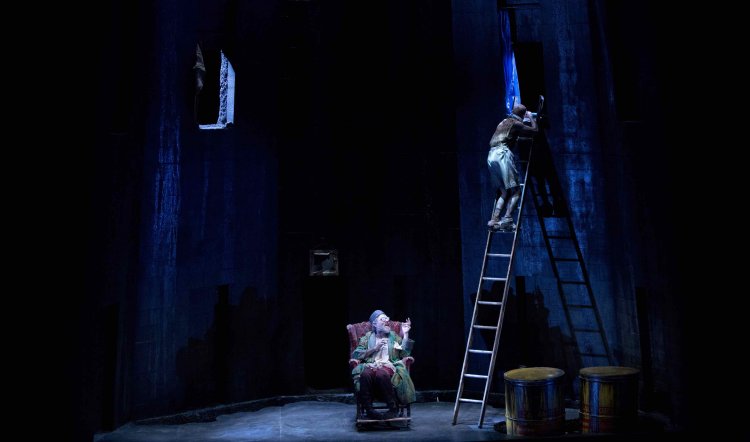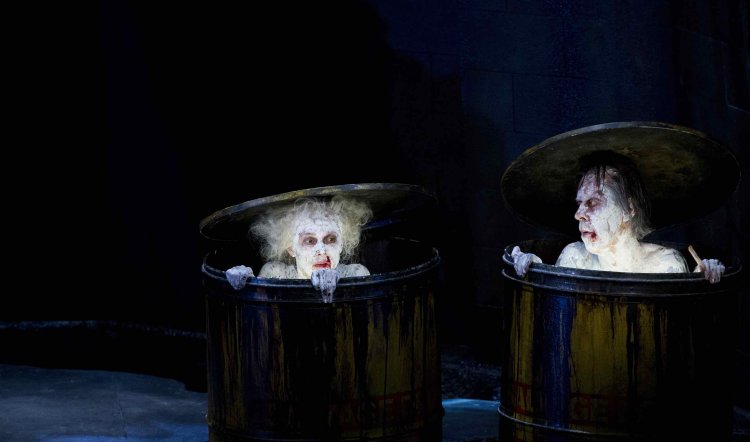
ENDGAME
ENDGAME, Sydney Theatre Company at the Roslyn Packer Theatre, opening night 7 April- to 9 May 2015. Photography by Lisa Tomasetti: above - Hugo Weaving and Tom Budge; right: Sarah Peirse and Bruce Spence.
In 2013, the cast of STC's Waiting For Godot waited in vain for fabled Hungarian director Tamas Ascher to arrive and take charge of rehearsals. He was unwell and, at the last minute withdrew, giving STC's artistic director Andrew Upton approximately ten minutes' notice to take over. The result was a triumph for him and actors Hugo Weaving, Richard Roxburgh, Luke Mullins and Philip Quast.
There were some churlish types however who whispered that Upton was somehow merely the beneficiary of Ascher's phoned in instructions via associate Anna Lengyel: that the production surely wasn't really his work…was it? The doubters should now be eating a large serving of humble pie if they were at the first night of Upton's latest adventures in BeckettWorld.
Endgame is one of the most mercurial plays ever written and to grasp and fashion it into an entertainment has to be one of the more challenging tasks for a director and cast. It slips through the fingers and in and out of the mind and the balancing act between pinning it to the stage and also allowing it and its players to fly is – when it works – breathtaking to watch.
Fascinating then that the production reunites Upton and Weaving: two men whose great friendship has recently been celebrated in print in the weekend papers. They seem, on the face of it, to embody opposing qualities: Weaving – all grounded gravitas and Upton – all impish flightiness. Yet appearances are deceiving and, of course, the superficial is exactly that. From their close collaboration on Endgame it might be said that each brings out the opposite in the other, so Weaving's old man Hamm is as capricious as Ariel even though he is confined to a chair and by his blindness. And Upton's overall vision of Samuel Beckett's one hour-50 minutes of waiting for the end of the world is at once as terrifying and hilarious as that unthinkable but logically likely event might really be.
They are aided and abetted in the enterprise by a superb team whose expertise is exhilarating in its creativity and attention to detail. The latter is exemplified in the casting of Sarah Peirse as Nell. She materialises but briefly, her presence heralded by the appearance of hesitant hands that reach into the air and along the rim of the filthy bin in which she lives. The cadaverously white, flaking fingers are prehensile, speculative, exploratory, not quite alive but not yet dead. Caught in the light, their presence and movements are magnetic, and then her head rises out of the bin behind them, eyes peering tentatively over the edge, red-rimmed in a scaly, fragmentary white and dirt-streaked face.
Beside her, in a similar bin, is Nagg, her husband and father of Hamm. With his preternaturally long face, innately comic presence and expressive eyes Bruce Spence was born to play the lugubrious grump and despite the extreme constraints of their roles, he and Peirse are spectacular. Both are confined to the bins and are without legs. Like everything else in the play this condition is never explained but assumes a looming symbolism along with Hamm's inability to stand and Clov's inability to sit.
Clov – son of Hamm – is also unable to escape his surly father's orbit. He is serf to the old man's cantankerous whims and spiteful humour. Tom Budge came late to the production after Robert Menzies's withdrawal through illness and the much younger actor brings a fizzing, furious energy to his relationship with Weaving. His CV is a fraction of the length of his companions' credits and is mostly screen time. (He was recently in the Nine Network series Gallipoli.) And his previous most notable stage appearance in Sydney was in 2003 and Belvoir's The Lieutenant of Inishmore, so his command of this role, the cast and the stage are exciting to witness.
Budge and Weaving bicker relentlessly but the weight of their miserable discontent is leavened by the ability of both actors to feel and extract every drop of humour from a word, a pause, a look, an intonation. The continuing ripples of laughter and outbreaks of chuckles and chortles coming from an audience in attendance at almost two hours of the end of the world is a tribute to the actors and their director in realising the play's craftily concealed possibilities.
The other remarkable aspect of this production is Nick Schlieper – responsible not only for the lighting (his day job) but also the set design. The two elements are effectively integrated with cold shafts of light illuminating seepage-slimy stone walls. The damp seems to have permeated with filth and mildew the ragged ruins of Hamm and Clov's clothes even as Nell and Nagg are in bodily decay (costumes by Renee Mulder). And if the disintegration of their surrounds isn't enough, there is the monotonous glittering fall and "plip" of dripping water (sound design Max Lyandvert) that also emphasises the height of a structure reminiscent of a 19th century Cornish tin mine's engine house.
In keeping with the play and this production, the contradictions are rich. The inherent grimness of the building is undercut by the comical: when Hamm demands that Clov look out of a window and tell him what he can see it requires a long ladder as the first row of windows is some four or five metres off the floor. Clov's relationship and interaction with the ladder is as exasperating yet vital to him as is his relationship and interaction with Hamm.
Like the moment in chess when it becomes clear all is lost, Endgame is not easy, but like chess, if surrender is inevitable that's when something else happens. In Beckett's play that something is a play that rewards the capitulation of both audience and actors alike: give yourself up to it and the prize is intoxicating and life-enhancing. The end of the world may possibly be quite similar.
Endgame will sell out and no extension is possible as Upton and Weaving will be leaving for the Barbican Theatre for the restaging there of STC's Waiting For Godot. Miraculously the original cast has been reassembled (Luke Mullins is currently playing Clov in the Melbourne Theatre Company's own Endgame!) and I hope to be reporting on it from London. Meanwhile: this Endgame is a brilliant production and not to be missed.




